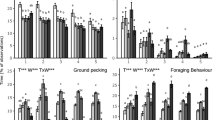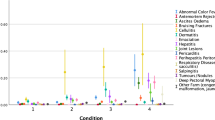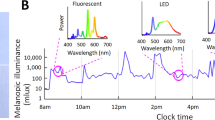Abstract
IT has been shown that some form of artificial lighting is necessary to achieve the most rapid gains of weight in broilers1. With controlled environments, light intensities of 0.1–6.0 ft.-c. gave equally good growth-rates in broiler chicks during the first eighteen days, and 12.0–24.0 ft.-c. produced slightly depressed growth-rates during this period2. A field scale survey has noted that in many broiler houses in Britain the light intensity is maintained at 0.05–0.20 ft.-c. as a control measure for the prevention of cannibalism3. An experiment is being conducted which has already compared three types of continuous lighting in relation to broiler performance.
This is a preview of subscription content, access via your institution
Access options
Similar content being viewed by others
References
Clegg, R. E., and Sanford, P. E., Poult. Sci., 30, 760 (1951).
Barott, H. G., and Pringle, E. M., J. Nutr., 45, 265 (1951).
Payne, C. G., Brit. Vet. J., 117, 36 (1961).
Author information
Authors and Affiliations
Rights and permissions
About this article
Cite this article
PAYNE, C. Colour and Density of Light and Broiler Performance. Nature 192, 769–770 (1961). https://doi.org/10.1038/192769a0
Issue Date:
DOI: https://doi.org/10.1038/192769a0
Comments
By submitting a comment you agree to abide by our Terms and Community Guidelines. If you find something abusive or that does not comply with our terms or guidelines please flag it as inappropriate.



